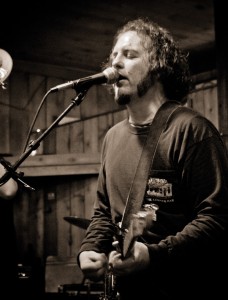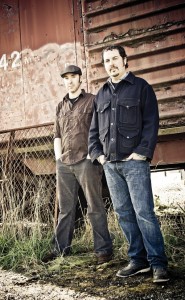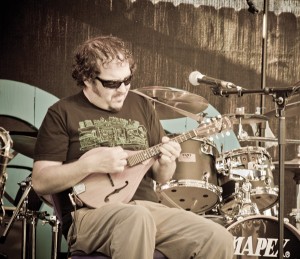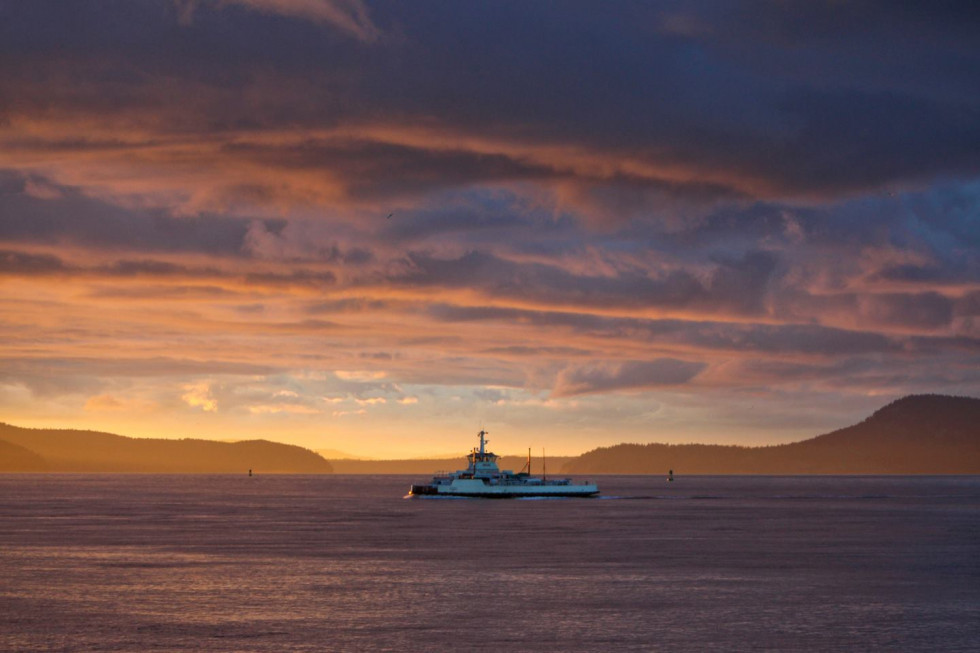
Photo by Kenneth Davenport, www.KennethDavenport.com
Navarro, the Fidalgo Island half of the Spoonshine Duo, was three years old when his family moved to a new Anacortes home on Happy Valley Road. Two years later, parents Fred Abelman and Bobbi Lauducci arranged for their young son to take violin lessons.
“Music and the arts were always held in high regard in my family,” said Navarro. In addition to the investment in their son’s violin lessons, Abelman and Lauducci invested some of their own talents in a belly dance troupe.
The mix of violin lessons, exposure to Middle Eastern culture and a growing love for all types of music led to a pivotal point in Navarro’s childhood. At age 10, he discovered the guitar.
“I was taken by it right away,” he reports.
The violin lessons would continue for a few years, but it was a passion for the guitar that found this Fidalgo Island boy practicing for hours alone in his room while his friends pursued more typical childhood interests.
“John Malone was my first instructor,” Navarro recalls. “That went about a year, long enough to get me going. John was good at instilling confidence, making me feel like I had talent. Honestly, I think I was a pretty slow learner at the beginning. There were a few other instructors, briefly, and then I was introduced to Thom Gustafson from Mount Vernon.”
“By the time I was taking lessons from Thom I was already head over heels in love with the guitar,” said Navarro. “I learned a lot from Thom – the fundamentals of music theory and how it related to the guitar neck. He’s definitely the big teacher, but more on the technical side of music. I was notoriously bad at doing what I was supposed to. I never practiced what I was supposed to practice.”
While he had a tendency to “stray from the script” in regard to lessons, Navarro quickly grasped a foundational truth in his music career: “A large part of success playing an instrument is the desire to learn, a willingness to practice,” he said. “More important than natural talent is putting in the time.”
“I remember my breakthrough moments of learning the tools to be able to improvise and compose what Thom taught me,” said Navarro. “I remember playing a pentatonic scale and thinking, ‘This sounds like a guitar solo!’”
 As a teen, there were a lot of musicians Navarro liked. As he listened he “tried to emulate some of their ideas.” Among his heroes was Scottish-born British musician Mark Knopfler, perhaps best known as co-founder of the band “Dire Straits.” Then there was Malian guitarist Ali Farke Toure; Greg Brown, Mark Ribot, Gillian Welch and David Rawlings, David Lindley and Doc Watson …
As a teen, there were a lot of musicians Navarro liked. As he listened he “tried to emulate some of their ideas.” Among his heroes was Scottish-born British musician Mark Knopfler, perhaps best known as co-founder of the band “Dire Straits.” Then there was Malian guitarist Ali Farke Toure; Greg Brown, Mark Ribot, Gillian Welch and David Rawlings, David Lindley and Doc Watson …
“But from a songwriting perspective,” Navarro emphasized, “nothing has had a greater influence on me than John and Alan Lowmax and their collections of folk music. I spend a lot of time reading the songs they collected, picking out the melodies. These collections are treasures.”
Closer to home, teen-aged Navarro finally started looking for musicians with similar dreams.
“I didn’t connect with other musicians until the end of high school. Then Brian Tottenham and I were playing together. I was taking lessons from Thom at the time and I asked, ‘Do you know any bass players?’ He said, ‘I know this guy Karl Blau. He reminds me of you … a great musician and a terrible student’.”
 Karl Blau is an indie rock and folk musician also based in Anacortes, and a member of the Knw-Yr-Own/K Records collective. In Blau and others Navarro not only gained inspiration, but he glimpsed the possibilities of commercial success. His list of other contemporaries at this time included Dave Mathews and the Gift Machine, Mytzlplk, Krusters Kronamid and Nate Ashley.
Karl Blau is an indie rock and folk musician also based in Anacortes, and a member of the Knw-Yr-Own/K Records collective. In Blau and others Navarro not only gained inspiration, but he glimpsed the possibilities of commercial success. His list of other contemporaries at this time included Dave Mathews and the Gift Machine, Mytzlplk, Krusters Kronamid and Nate Ashley.
Still, the demands of independent life crept ever closer. After graduation from high school in 1992, the young musician opted to attend community college.
“I took about two quarters of music theory at Skagit (Valley College), and that was that,” he said. “I guess I never seriously considered a career (outside of music). I did carpentry, worked in a factory painting strips of trim. I ran a travel lift at a boatyard, taught music at Secret Harbor School … I just bounced around. But all those things were just a stop-gap with the hope I would just be doing music at some point.”
“We had Captain Fathom going when I was maybe 17,” Navarro recalls. “We had our own little regional following. The Rexville Grange was the place to perform, not just for us but for other bands in the area. We were always excited about any local bands that were playing. We were big fans of Gravel. To this day, I still consider Karl and those guys a big influence in on me in my formative years of playing. There was a handful of contemporary bands in the area from Bellingham to Anacortes. There was a real sense of community.”
 The “early years” included performances during “fai do dos” at How It Works, the graphics and multi-media business located initially behind a Commercial Avenue bakery (“fai do do” means “get-together” in Cajun).
The “early years” included performances during “fai do dos” at How It Works, the graphics and multi-media business located initially behind a Commercial Avenue bakery (“fai do do” means “get-together” in Cajun).
“Definitely a very large swath of the community turned out for those,” said Navarro. “It was one place where I saw circles sort of cross over, for sure. People who like music such as bluegrass, standard jazz, are not necessarily going to comfortably rub shoulders with someone who plays punk rock, but occasionally it happened.”
Then came “Spoonshine.”
“I met Bill Cook, and we’re still playing together today. Spoonshine, at some point, was made up of me and Bill and James Harper, Matt Ambrose … that was the format for a number of years. Now Bill and my platform is to sort of add to the group as we see fit.”
“We deal almost entirely with original music,” he said. “Americana is what we’ve sort of focused on, but certainly there were a lot of other influences. I have listened to music from all over the world. Mark Knopfler was, still is, a major influence. Tony Rice – flat picking and bluegrass – led to a sort of turning point with Americana in mind.”
“I try to play every day,” Navarro says. “I spend a lot of time playing and writing. Bill and I try to get together regularly. That keeps us on our toes. I do some solo performances, sit in on guitar with others once in awhile, but my main thing us collaborating with Bill.”
Both include composition among their many talents.
“We each write complete songs on our own, then we get together at my studio,” said Navarro. “Sometimes the song stands as it is, sometimes we collaborate … add a bridge here, change something there … until we bring it around to its finishing point.”
On question of whether Anacortes – its natural setting and people – have any influence on his music, Navarro responds: “That has a big influence, for sure. I was more nostalgic about it early on than I am now, but I’ve always been interested in industry here – the fishing, logging – the sort of blue collar aspect of the area.”
That fact is apparent in songs with lyrics that make reference to the city’s natural assets as well as trades including fishing, forestry and refineries. But Navarro is quick to point out his “stories” rarely have anything to do with his personal life.
“For me, writing is 99 percent pure fiction,” he said. “It’s not autobiographical, but purely out of the imagination. Certain things inspire you to come up with a story. If I wrote songs about my daily life, they’d be very dull, very boring.”
Increasingly, the road of success means trips away from Fidalgo Island … past the marina and a shrinking fleet of commercial fishing boats, past the refineries and their lighted columns, over the Swinomish Channel and through the rich farming area of the Skagit Valley.
But Navarro embraces the change, welcomes the draw of the unknown. Besides, ventures into the urban world are not without reward.
“I love Anacortes, but I also love being in the city,” he said. “This last summer we spent most of our time in Seattle, places like the Tractor Tavern and Columbia City Theatre. On one occasion we were playing at Brad’s Swingside Café. Mark Knopfler and his band came through, kicking off a North American tour. They invited Bill and me to a back room to do some of our show. That was cool. About a week after that I recorded mandolin with Eddie Vedder on the song ‘Better Days,’ which was used in the soundtrack for ‘Eat Pray Love.’ It was a good couple of weeks!”
Future plans include a mix of time spent on and off the island.
“I definitely like both small town and city,” said Navarro. “There are ups and downs to both ways of living. One thing I love about a small town is that it holds you to a higher standard. Everybody knows you. You’re not anonymous. You have to be part of the community, and in a good way.”
Navarro, who plays acoustic guitar, electric guitar, mandolin, a little bit of banjo and saxophone, said he has never suffered stage fright. Perhaps that has something to do with this community’s reputation for embracing its artists.
“It seems that since I came through the school system there were always young bands writing original music and rocking out,” he said. “That seems to still be the case. Others, those who like music like bluegrass, jazz – exist in separate circles, but they contribute to a surprisingly vibrant music scene for a community this size. I’d like to think it’s a symbiotic relationship. As far as the arts go, especially in this town, people err on the side of being supportive.”
Wherever the road leads, Navarro will be grateful for the contributions his family, friends and community have made to the realization of his dream.
“I’m extremely happy,” he says, “to be doing music full-time.”
Another Good Read: Nine Questions for Jacob Navarro
